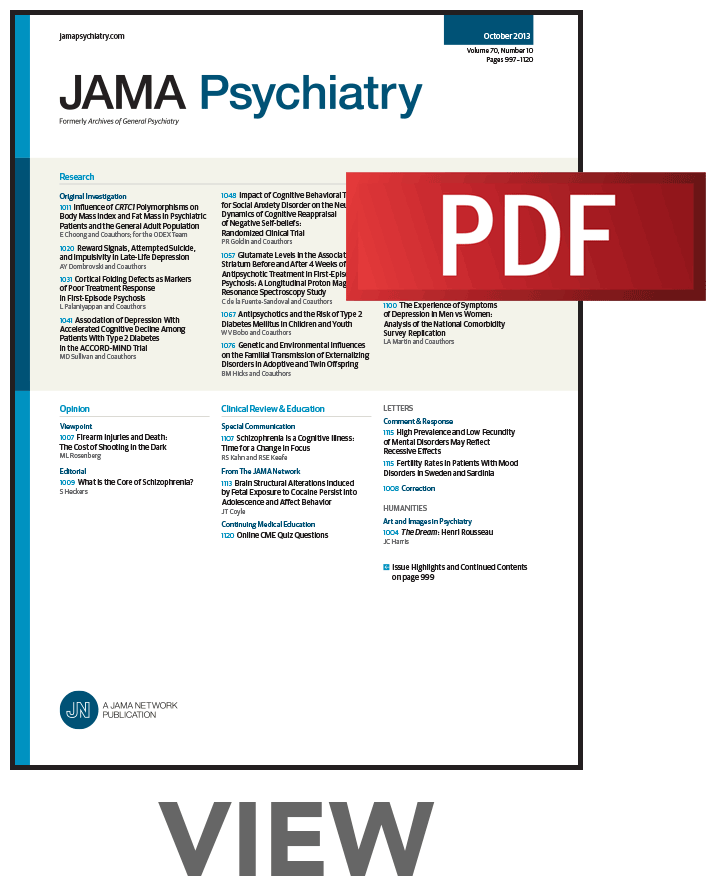Glucagon-Like Peptide 1 Receptor Agonists and Mental Health: A Systematic Review and Meta-Analysis.
IF 17.1
1区 医学
Q1 PSYCHIATRY
引用次数: 0
Abstract
Importance People with obesity and diabetes have poorer psychiatric and cognitive outcomes and lower quality of life (QOL) compared with those without. Glucagon-like peptide 1 receptor agonists (GLP1-RAs) are treatments for diabetes and obesity that may also influence psychiatric outcomes. Objective To conduct a meta-analysis of randomized placebo-controlled trials to evaluate psychiatric, cognitive, and QOL outcomes with GLP1-RA treatment. Data Sources MEDLINE, Embase, PsycINFO, and CENTRAL databases were searched from inception through June 24, 2024. Study Selection Double-blind placebo-controlled trials comparing GLP1-RA to placebo in adults with overweight/obesity and/or diabetes, reporting on psychiatric, cognition, or QOL outcomes, were included. Data Extraction and Synthesis Data extraction was performed in parallel by 2 reviewers. Random-effects meta-analysis was performed. Effect size measures were log risk ratios (log[RR]) and standardized mean differences (Hedges g). The quality of studies was appraised using the Cochrane risk-of-bias tool (RoB2). Certainty of evidence was assessed via GRADEpro. Main Outcomes and Measures Main outcomes were risk of psychiatric adverse events (serious and nonserious) and change in mental health symptom severity, health-related quality of life, and cognition. Results Eighty randomized clinical trials involving 107 860 patients were included in the meta-analysis. The mean (SD) age of participants across studies in the meta-analysis was 60.1 (7.1) years; 43 251 were female (40.1%) and 64 608 male (59.9%). GLP1-RA treatment was not associated with a significant difference in risk of serious psychiatric adverse events (log[RR] = -0.02; 95% CI, -0.20 to 0.17; P = .87) and nonserious psychiatric adverse events (log[RR] = -0.03; 95% CI, -0.21 to 0.16], P = .76), or depressive symptom change (g = 0.02; 95% CI, -0.51 to 0.55; P = .94), compared with placebo. GLP1-RA treatment was associated with improvements in restrained eating (g = 0.35; 95% CI, 0.13 to 0.57; P = .002) and emotional eating behavior (g = 0.32; 95% CI, 0.11 to 0.54; P = .003) and in mental health-related QOL (g = 0.15; 95% CI, 0.07 to 0.22; P < .001), physical health-related QOL (g = 0.20; 95% CI, 0.14 to 0.26; P < .001), diabetes-related QOL (g = 0.23; 95% CI, 0.15 to 0.32; P < .001), and weight-related QOL (g = 0.27; 95% CI, 0.18 to 0.35; P < .001) compared with placebo. Conclusions and Relevance In patients with overweight/obesity and/or diabetes , GLP1-RA treatment is not associated with increased risk of psychiatric adverse events or worsening depressive symptoms relative to placebo and is associated with improvements in QOL, restrained eating, and emotional eating behavior. These findings provide reassurance regarding the psychiatric safety profile of GLP1-RAs and suggest that GLP1-RA treatment contributes to both physical and emotional well-being.胰高血糖素样肽1受体激动剂与心理健康:系统综述和荟萃分析。
与没有肥胖和糖尿病的人相比,肥胖和糖尿病患者的精神和认知结果更差,生活质量(QOL)也更低。胰高血糖素样肽1受体激动剂(GLP1-RAs)是糖尿病和肥胖症的治疗方法,也可能影响精神预后。目的对随机安慰剂对照试验进行荟萃分析,以评估GLP1-RA治疗的精神、认知和生活质量结果。数据来源medline, Embase, PsycINFO和CENTRAL数据库从开始到2024年6月24日进行了搜索。研究选择纳入了在超重/肥胖和/或糖尿病患者中比较GLP1-RA和安慰剂的双盲安慰剂对照试验,报告了精神病学、认知或生活质量结果。数据提取与综合数据提取由2位审稿人并行进行。进行随机效应荟萃分析。效应大小测量是对数风险比(log[RR])和标准化平均差异(Hedges g)。采用Cochrane风险偏倚工具(RoB2)评价研究质量。通过GRADEpro评估证据的确定性。主要结局和测量主要结局是精神不良事件(严重和非严重)的风险、精神健康症状严重程度、健康相关生活质量和认知的改变。结果纳入80项随机临床试验,共107 860例患者。meta分析中所有研究参与者的平均(SD)年龄为60.1(7.1)岁;其中女性43 251例(40.1%),男性64 608例(59.9%)。GLP1-RA治疗与严重精神不良事件风险无显著差异(log[RR] = -0.02;95% CI, -0.20 ~ 0.17;P = 0.87)和非严重精神不良事件(log[RR] = -0.03;95% CI, -0.21 ~ 0.16], P = 0.76),或抑郁症状改变(g = 0.02;95% CI, -0.51 ~ 0.55;P = .94)。GLP1-RA治疗与抑制进食的改善相关(g = 0.35;95% CI, 0.13 ~ 0.57;P = .002)和情绪化饮食行为(g = 0.32;95% CI, 0.11 ~ 0.54;P = 0.003)和心理健康相关生活质量(g = 0.15;95% CI, 0.07 ~ 0.22;P < 0.001),身体健康相关生活质量(g = 0.20;95% CI, 0.14 ~ 0.26;P < 0.001),糖尿病相关生活质量(g = 0.23;95% CI, 0.15 ~ 0.32;P < 0.001),体重相关生活质量(g = 0.27;95% CI, 0.18 ~ 0.35;P < 0.001)。在超重/肥胖和/或糖尿病患者中,与安慰剂相比,GLP1-RA治疗与精神不良事件风险增加或抑郁症状恶化无关,与生活质量、克制饮食和情绪性饮食行为的改善有关。这些发现为GLP1-RAs的精神病安全性提供了保证,并表明GLP1-RA治疗有助于身体和情感健康。
本文章由计算机程序翻译,如有差异,请以英文原文为准。
求助全文
约1分钟内获得全文
求助全文
来源期刊

JAMA Psychiatry
PSYCHIATRY-
CiteScore
30.60
自引率
1.90%
发文量
233
期刊介绍:
JAMA Psychiatry is a global, peer-reviewed journal catering to clinicians, scholars, and research scientists in psychiatry, mental health, behavioral science, and related fields. The Archives of Neurology & Psychiatry originated in 1919, splitting into two journals in 1959: Archives of Neurology and Archives of General Psychiatry. In 2013, these evolved into JAMA Neurology and JAMA Psychiatry, respectively. JAMA Psychiatry is affiliated with the JAMA Network, a group of peer-reviewed medical and specialty publications.
 求助内容:
求助内容: 应助结果提醒方式:
应助结果提醒方式:


